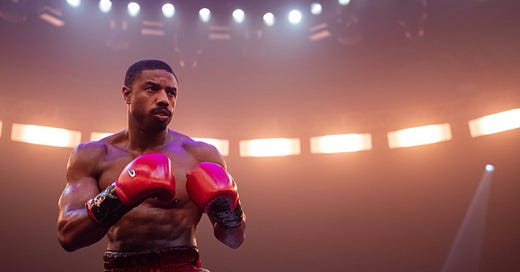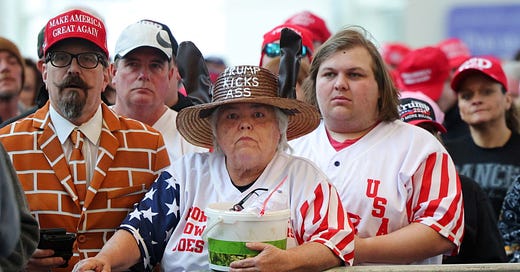The Creed series has been an entertaining extension of the Rocky films, a stylish and occasionally moving addition to the venerable boxing franchise. Creed III is no exception. But it does feel like a series that is sometimes at war with itself, straining against and within the limits of franchise branding.
This sense is encapsulated most succinctly in the first film when Adonis Johnson (Michael B. Jordan) is given a stark choice: He can fight under the last name of his biological father, Apollo Creed (Carl Weathers), who died before he was born and whom he never knew, and gain a shot at the title against soon-to-be-imprisoned Brit Ricky Conlan (Tony Bellew). Or he can stick with the name Johnson and try to work his way up through the boxing ranks on his own merit.
As you might guess from the title, he takes the shortcut.
Creed II spins an interesting variation on this predicament: What happens when your name isn’t a help but a hindrance? Relying again on nostalgia from the original series, the most poignant elements of this sequel have little to do with Adonis Creed or Rocky Balboa (Sylvester Stallone), but rather with Ivan Drago (Dolph Lundgren) and his son, Viktor (Florian Munteanu). Drago was exiled to Ukraine following his humiliating defeat at the end of Rocky IV, and the most compelling arc in Creed II involves Drago’s slow realization that the love and safety of his son are more important than being reintegrated into Russian society. Their name may be a curse, but it’s one they share; they have only each other.
Though, once again, it is that very name that springboards Viktor into the big time, the Drago moniker that earns him his title shot and his huge payday.
Creed III is the first movie in the spinoff series to lack Stallone; a contract and creative dispute kept the Italian Stallion from reprising his role once again. It also lacks callbacks to previous entries in the series: Adonis isn’t fighting the son of Clubber Lang; Adrian’s ghost doesn’t make an appearance. This is the first Creed movie where Creed really comes into his own, where he is allowed to chart his own path.
And you know what? Adonis Creed is kind of a jerk.
Yes, he’s a loving husband to pop producer Bianca (Tessa Thompson) and a doting father to Amara (Mila Davis-Kent). Having retired from the fight game, however, he’s slid into the role of promoter; as such, his priorities have changed somewhat. When Damian “Dame” Anderson (Jonathan Majors), an old friend and former Golden Gloves champ, gets out of prison and is looking for a shot to get back into boxing, Adonis slots him into a title fight against his best prospect, Felix Chavez (Jose Benavidez). He thinks it’ll be a big hit, shades of Apollo giving Rocky a shot at the belt.
And, like Apollo, Adonis has made a tactical mistake.
Dame isn’t just hungry, he’s willing to fight dirty to get what he wants. He doesn’t care about Adonis’s carefully laid plans or the Delphi gym’s plans for Felix; all he cares about is taking that title. If that takes a carefully placed elbow or a dirty hold, well, so be it.
We’re encouraged to see Dame as the bad guy here, and Majors does a good job of playing him as something akin to the Joker, an agent of chaos descending on Adonis to blow up his happy little life. In reality, though, Adonis brought all of this on himself. Dame went to prison for a fight that Adonis started. Adonis never once reached out to him. Then Adonis sets up a dangerous fight for his star boxer not because it’s good for the boxer but because it’s good for his promotion. And Adonis throws his one-time friend—the guy who went to prison for Adonis, who blew up his own life for Adonis—into the ring as a sacrificial lamb, a body to generate views and revenues.
Jordan’s performance in the series keeps Adonis in the realm of “compellingly complicated” rather than “hopelessly confused.” His portrayal reflects the way Adonis is simply stuck, captured by fate: an undoubtedly talented fighter whose skill is at least in part a result of his genetic inheritance; a hard-working striver who wanted to make it on his own but quickly accepted the benefit of his father’s legacy when it suited him. He’s the boxing equivalent of a nepo-baby: undeniably skilled, probably better at what he does than most others in his business, and yet frustrated by the ever-present idea that he’s only as successful as he is thanks to his last name. The same could be said for the franchise writ large.
Again, I like this movie—Jordan, making his directorial debut, does something interesting with the last fight that helps distinguish it from every title bout in the series that came before—just as I liked its predecessors. That said, I can’t help but feel as if the whole endeavor is best understood as an almost accidental condemnation of the franchised-to-death state of the cinematic landscape. Would Creed III be looking at a $40 million opening weekend if not for Rocky and Apollo’s legacy? Would anyone be interested if the same exact movie had another boxer’s name on the poster?
All of which is to say: Adonis Creed isn’t the only nepo-baby on display here.
Subscribe to The Bulwark
Analysis and reporting on politics and culture in America. Home to Sarah Longwell, Tim Miller, Bill Kristol, JVL, Sam Stein, and more. No partisan loyalties. No tribal prejudices.











